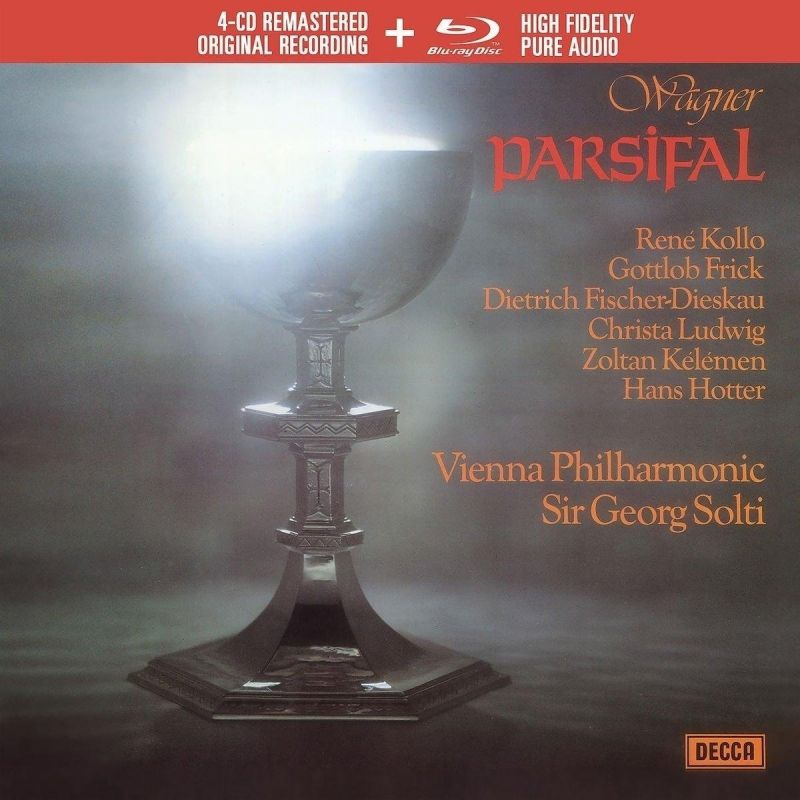WAGNER Tristan und Isolde. Parsifal (Solti)
View record and artist detailsRecord and Artist Details
Composer or Director: Richard Wagner
Genre:
Opera
Label: Decca
Magazine Review Date: 05/2018
Media Format: CD or Download
Media Runtime: 260
Mastering:
DDD
Catalogue Number: 483 2510DH05

Tracks:
| Composition | Artist Credit |
|---|---|
| Parsifal |
Richard Wagner, Composer
Christa Ludwig, Kundry, Mezzo soprano Dietrich Fischer-Dieskau, Amfortas, Baritone Georg Solti, Conductor Gottlob Frick, Gurnemanz, Bass Hans Hotter, Titurel, Bass-baritone René Kollo, Parsifal, Tenor Richard Wagner, Composer Vienna Boys' Choir Vienna Philharmonic Orchestra Vienna State Opera Chorus Zoltan Kélémen, Klingsor, Baritone |
Composer or Director: Richard Wagner
Genre:
Opera
Label: Decca
Magazine Review Date: 05/2018
Media Format: Blu-ray
Media Runtime: 240
Mastering:
DDD
Catalogue Number: 483 2513DH04

Tracks:
| Composition | Artist Credit |
|---|---|
| Tristan und Isolde |
Richard Wagner, Composer
Arnold Van Mill, King Marke, Bass Birgit Nilsson, Isolde, Soprano Ernst Kozub, Melot, Tenor Fritz Uhl, Tristan, Tenor Georg Solti, Conductor Peter Klein, Shepherd, Tenor Regina Resnik, Brangäne, Sopranbo Richard Wagner, Composer Theodor Kirschbichler, Steersman, Baritone Tom Krause, Kurwenal, Baritone Vienna Gesellschaft der Musikfreunde Singverein Vienna Philharmonic Orchestra Waldemar Kmentt, Young Sailor, Tenor |
Author: Hugo Shirley
With the Tristan, the reasons are perhaps not too difficult to find. Despite it featuring the same soprano-conductor combination as that Elektra and Salome – not to mention the Decca Ring – it finds neither of them on ideal form. The reprinted cover inadvertently points to another issue with the release: the names of Nilsson and Solti are given pride of place, with the name of the Tristan relegated, with the others, to something like a bit part.
Admittedly, that name, Fritz Uhl, has not secured its place in vocal Valhalla, and he is very much a weak link. The voice is occasionally appealing but never heroic: he bobs around helplessly in Wagnerian waters made especially choppy by an apparently impatient Solti. But even Nilsson herself can struggle to assert herself against Solti’s Vienna Philharmonic – strident and somewhat stringy of tone in a score that demands something more yielding and seductive.
One can tell that it’s still early days for the soprano in a role that she would make her own: she’s heard to much better effect in the Böhm-Bayreuth set, which also benefits from what she’d learnt from working with Wieland Wagner. Tom Krause’s lively Kurwenal is the best among the rest of the cast. There are some thrills, undeniably, to hearing the fierce orchestral performance dusted off, and there’s a welcome bonus in the form of a contemporary radio documentary (presented by John Culshaw) about the recording, although a segment featuring Solti at the piano duetting with Uhl sounds suspiciously like a singalong around a pub piano.
The Parsifal is a far more impressive achievement. Solti is in less of a mad rush and paces the score extremely well, despite never really getting that close, to my ears, to its spiritual heart. Despite the cleaned-up remastering, the orchestral sound is still a little short on bloom and roundness, with a slight reediness to the violins and a thinness to the oboe.
The cast is a serious, much better-balanced line-up, though. Gottlob Frick, an implacable Hagen and Hunding in Solti’s Ring, is an honest, moving Gurnemanz; his bass, though showing its age, is sonorous and imposing. René Kollo is an impressive, fresh-voiced Parsifal and Christa Ludwig a gloriously seductive Kundry. Dietrich Fischer-Dieskau makes a convincing Amfortas, though with a little help, one suspects, from the engineers. Hans Hotter certainly leaves no doubt as to Titurel’s frail condition. A bunch of Flower Maidens that includes Lucia Popp and Kiri Te Kanawa is not to be sniffed at.
Both releases are amply documented, and Culshaw’s lengthy note on the Tristan recording (it was Christopher Raeburn by the time of Parsifal) is particularly revealing, not least regarding the way in which his engineering favours the orchestra. Neither of these sets would be a first choice, least of all the Tristan, but both are important documents that fully deserve the treatment they get here.
Discover the world's largest classical music catalogue with Presto Music.

Gramophone Digital Club
- Digital Edition
- Digital Archive
- Reviews Database
- Full website access
From £8.75 / month
Subscribe
Gramophone Full Club
- Print Edition
- Digital Edition
- Digital Archive
- Reviews Database
- Full website access
From £11.00 / month
Subscribe
If you are a library, university or other organisation that would be interested in an institutional subscription to Gramophone please click here for further information.




